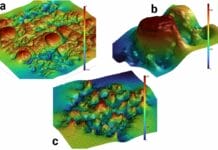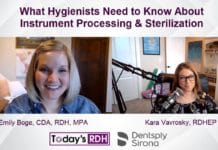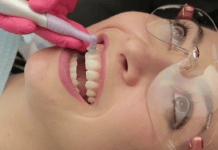Presenters at Frontiers in Cardiovascular Biology, a conference hosted by the European Society of Cardiology, revealed their ongoing preclinical research into the link between good oral hygiene and heart attack recovery. The study, which used mice as test subjects, found that bacteria from periodontitis can prohibit blood vessels from healing properly. Over 700 participants from 40 different countries attended the Frontiers in CardioVascular Biology event to learn about the latest scientific developments in the basic and translational cardiovascular field.
According to data from the Centers for Disease Control and Prevention, an estimated 610,000 (or 1 in every 4) people die of heart disease in the United States every year. About 735,000 Americans have a heart attack every year due to coronary heart disease. Since heart disease is the leading cause of death for both men and women, there is prevalent data and research showing how health conditions like diabetes or high cholesterol can lead to people developing cardiovascular disease. There are fewer studies that focus on how oral health and cardiovascular disease are connected, however past research revealed that periodontal disease might increase the risk of cardiovascular disease, and lead to worse health outcomes, for patients with atherosclerosis (or clogged arteries).
Dr. Sandrine Delbosc, the study’s associate investigator from the Inserm Laboratory for Vascular Translational Science in Paris, France, revealed their previous research showed a potential link between cardiovascular disease and periodontal disease caused by periodontal bacteria, porphyromonas gingivalis. The researchers originally hypothesized that periodontal bacteria would enter the bloodstream and cling to atherosclerotic lesions, which would prevent the lesion from healing properly.
Upon further investigations, Dr. Delbosc found that porphyromonas gingivalis produces an enzyme called gingipaïn which can prevent immune cells from working properly. She concluded: “Our study shows that the bacteria that cause gum disease impair the healing and repair of arteries. This impaired healing may be due to an enzyme produced by the bacteria that stops the body’s immune cells from repairing the arteries.”
Dr. Delbosc plans to conduct the study again with patients in a clinical trial. Her research group will design a study which examines whether non-surgical periodontal therapy/SRP and surgical periodontal treatments can prevent periodontal bacteria from seeping into the bloodstream and affecting the health outcomes of patients with cardiovascular diseases.
Their preliminary research may demonstrate patients who take good care of their oral hygiene may significantly improve their health outcomes if they are recovering from acute cardiovascular events, such as a heart attack or aortic dissection. She hopes the experimental findings from her study will encourage not only dental professionals but other health care providers, to educate and encourage patients to take better care of their oral health, especially if the patients have cardiovascular disease.
SEE ALSO: Could Periodontal Disease Have an Autoimmune Component?
DON’T MISS: Is Saliva the Future of Diagnostics?











